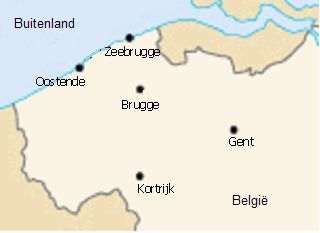AZ Damiaan Oostende
AZ Damian Ostend wants to use new ELISA kits for the detection of Mycoplasma pneumoniae antibodies. This research compares the results of new EUROIMMUN kits with the known results of their current kits of Labsystems Diagnostics. There are no clear-cut symptoms that are specific for a M. pneumoniae infection which makes diagnosing very difficult. It is important to detect an infection because there are specific antibiotics for treatment. The aim of this research is a validation of the new kit to find out if the new kit is as efficient as their current kit.
There were 46 samples previously analyzed with the old kits, that were now analyzed with the new kits. These results were then compared to each other. The experiment also tested the specificity of the kits by analyzing different samples, that were positive for other infections, with the new IgM kit. Finally, the sensitivity was tested with a PCR of nasal swabs of several patients. In each run, there were controls that were tracked and compared with the other runs by calculating the mean, standard deviation, coefficient of variation, bias and the total error. Fifteen out of 46 showed discordant results in comparison to the known results of the current kit. The discordant results were false negative or false positive due to the age of the patients, cross-reactivity or the insensitivity of the new kit. The sensitivity of the IgM kit is 73,33 % and of the IgG kit 85,19 %. The specificity of the IgM kit is 90,32 % and of the IgG kits 100,00 %. The result of the PCR test is that all the samples tested negative for Mycoplasma pneumoniae DNA.
The lab has some demands for the tracked controls. The total error has to be less than 50 % and the coefficient of variation may be maximum a third of the total error, around 16,67 %. The control of IgM has a total error of 2,18 % and IgG 8,42 %. The coefficient of variation of the IgM control is 0,92 % and of the IgG control is 3,43 %.
The lab chooses to use the kits of Labsystems Diagnostics, because of the bad cross-reactivity with the EUROIMMUN kit. The kit of EUROIMMUN showed three cases of cross-reactivity and the kit of Labsystems Diagnostics none.
Legionella pneumophila is a bacteria that can cause serious diseases in humans such as the Veteran disease and the Pontiac fever. It is therefore important to diagnose this bacteria quickly before irreversible damage occurs to the patient. It is not possible yet to determine the bacteria through urine antigen-detection in the AZ Damiaan lab. The aim of this study is therefore to compare three kits for the determination of Legionella pneumophila in urine. The kit that scores best will then be routinely used by the lab.
The tested kits were BinaxNow (Abbott), ImmuView (International Medical) and CerTest (Selinion). The three kits were tested for specificity, sensitivity, PPV, NPV and accuracy. This was done using 20 positive samples. The kits were also compared based on the price-quality ratio, inclusion of the controls, ease of use, logistics and distribution.
The BinaxNow kit and the ImmuView kit both achieved high sensitivity and high specificity, while the Certest kit achieved a high sensitivity, but a low specificity. The Certest kit is the cheapest, but if the other criteria are compared, the BinaxNow kit comes out best. The kit uses a device to read samples, is easy to use, includes a positive and negative control as standard and the company already supplies other kits to the lab.
The Abbott BinaxNow kit scored best on both statisticall and on other criteria tested. This kit will therefore be included in the routine of the lab
AZ Damiaan Oostende wants to perform the detection of Varicella zoster virus antibodies in-house on the DS2 platform from Dynex®. The aim of this validation is to evaluate two ELISA kits from different companies (EuroImmun and Vircell).
The detection of Varicella zoster virus antibodies is important for several patients. Pregnant women who get in contact with the virus, need to know their immune status for the protection of their unborn child. There are several kits available for detection.
Different samples were validated and compared on both kits in a short time-frame. Several runs were performed on the DS2 platform with the same samples under the same conditions to compare the results of both kits. The samples were tested for both IgM- and IgG-positivity and compared to the results obtained by the laboratory AML, where these tests were done on a chemiluminescence immunoassay platform. The controls of each run were tracked and compared to each other by calculating mean, standard deviation and coefficient of variation. Specific samples were tested to see if there was any cross-reactivity to Epstein-Barr virus, Herpes simplex virus, Reumafactor and Cytomegalovirus in the detection of IgM-antibodies.
The coefficients of variation were for both IgM and IgG from both kits less than 10%. There was only one sample out of 28 that was discordant for.
The IgM kit from Vircell had significant more cross-reactivity than EuroImmun.
EuroImmun IgM, IgG and Vircell IgM and IgG showed a sensitivity of 100%. The specificity was 100% for EuroImmun IgM, Vircell IgM and IgG. The kit EuroImmun IgG had a specificity of 83,3%.
Due to the lower cross-reactivity and practical considerations, the laboratory chooses to use the IgM/IgG-kits from EuroImmun.
Address
|
Gouwelozestraat 100
8400 Oostende
059 41 40 40 Belgium |
Contacts
|
Traineeship supervisor
Apr. L. Vynckier
|
|
Lies Persijn
|
|
|


